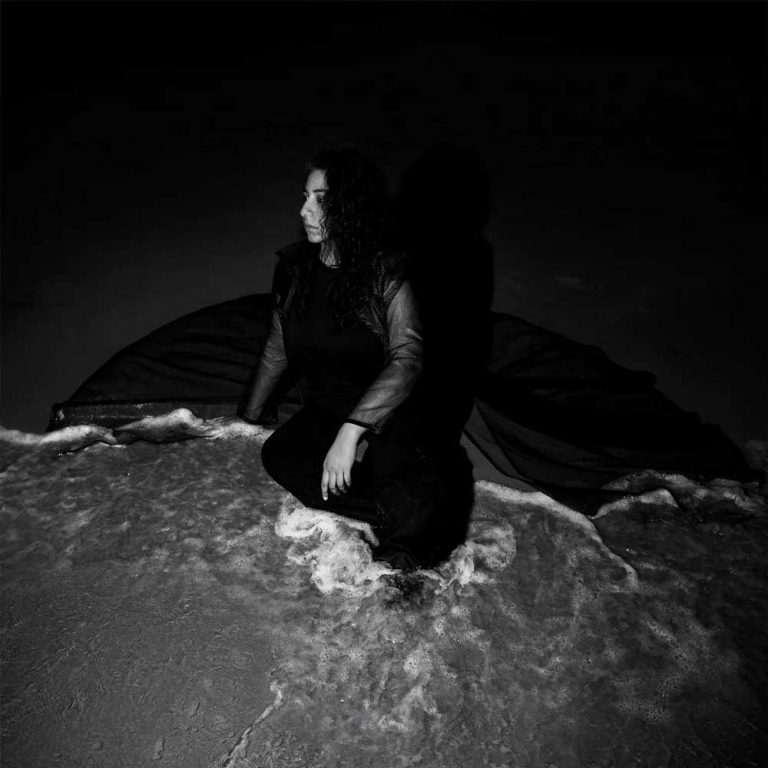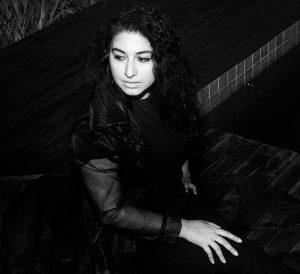Arooj Aftab has always been a child of the night. Growing up in Lahore, Pakistan, she’d listen to vinyl records – jazz, soul, South Asian music – until the wee hours, and would attend her parents’ all-night mushaira social gatherings, in which Urdu poetry forms were recited and sung. She recalls drives through the capital with car windows down, smelling the scent of jasmine that only bloomed after dark, and later, midnight jam sessions at Berklee College of Music in Boston, where she studied jazz composition and audio engineering.
A move to New York, in 2009, made sense. This wasn’t just a city with thriving jazz and experimental music scenes and record shops that welcomed her penchant for crate-digging. It was the city that never sleeps.
Welcome then, “Night Reign”, Aftab’s fourth solo album, a project inspired by the night and her years living in NYC, by her pledge to be true to herself. The follow up to the critically-acclaimed “Vulture Prince”, It’s a work of originality, candour and authenticity; of rebirth, celebration and a kind of knowing dissonance. A project whose nine tracks, six in Urdu, three in English, speak to the night as a protagonist.
“So it’s like, what does this person give you?” says the singer, composer and producer, seated in London’s Universal Music offices at an ungodly daylight hour. “It is giving you the party until 6am. The small evening meeting of old friends after many years. The talking to your mum with the time difference in Pakistan. The falling in love. The end of the whisky in the bottle. It is giving you so many colours of things.”
Helping Aftab bring us into the night and closer to who she is, are bandmembers including bassist Petros Klampanis and “heavy metal” harpist Maeve Gilchrist, alongside a raft of leftfield guests from vibraphonist Joel Ross and Cautious Clay on flute to spoken word poet Moor Mother and – on “Zameen”, a song for peace originally sung by India’s legendary Begum Akhtar – singer/songwriter Marc Anthony Thompson, aka Chocolate Genius.

AROOJ AFTAB Night Reign
Available to purchase from our US store.“I think that nobody really does anything alone, but at the same time we are deeply alone,” says Aftab in her thoughtful, erudite way. “That juxtaposition is important to understand. You have to be truthful about your strongest points, then search for people who understand you and want to play your music, so you have that beautiful tandem thing of creating something together. But it is one person’s vision. That’s the key.”
The Saudi Arabia-born Aftab builds worlds with her music, folding in styles she has earned, inherited, borrowed or recycled from the heritages and communities she has learned from. On “Vulture Prince” she magicked a diorama of intense, enveloping stillness, her astounding voice shapeshifting, carrying us away, carving a channel for grief and healing. That album’s signature tune, “Mohabbat” – a much covered ghazal poem-sonnet written in the 1920s – won her Best Global Music Performance at the 2022 Grammys. “Udhero Na”, a track from the expanded edition featuring sitarist Anoushka Shankar, was nominated the following year.
“I spent several years trying to figure out what my presentation of ‘Mohabbat’ would be,” she says of her breakthrough song and its five movements. “I dug and dug until it surprised me, made me joyous, made me cry. It was so subtle and intricate I felt there was no way anyone would understand how amazing it feels to me. But everyone understood.”

Aftab went on to play festivals and venues around the world, refuting stereotypes by drinking wine, cracking jokes, and swearing. Her songs, however, were inevitably delivered to pin-drop, in-the-moment silence. “I think a music like this didn’t exist before,” she continues. “I could hear it in my mind, and I spent a lot of time creating it. Now I would say it is a new genre that is expanding over time with new collaborators and a growing numbers of admirers.”
She won more fans with “Love in Exile”, a Grammy-nominated 2023 co-release with composer/pianist Vijay Iyer and multi-instrumentalist Shazad Ismaily (who played on “Mohabbat”), recorded on-the-fly in a single session in NYC and lauded for its shadowy, free-form invention. Aftab says she went where her voice-as-instrument led her: “I let it do what it wants to do and then it’s doing it, and I’m like, ‘This is fantastic’.”
On “Night Reign”, she similarly departs from tradition. Featuring Ismaily on synth, lead single “Raat Ki Rani” is a pulsating, subtly auto-tuned paean to “a person whose allure floats through a beautiful evening garden party.” “Saaqi” uses layered vocal harmonies (and Iyer on piano) to tell of a girl assuming her power.
“Na Gul” presents a poem written by 18th century Urdu musician/courtesan Mah Laqa Bai Chanda, then imagines the latter in conversation with Chand Bibi, the 16th century warrior queen who defeated the Mughul armies under Akbar – “Both these women were badasses, two hundred years apart”, Aftab deadpans. “Bolo Na” is an old song about authentic love reimagined as a rallying cry, as Moor Mother rails against systematic racism and greed, her truth-telling a firebrand.
Buoyed by Clay, Gilchrist and guitarist Kaki King on the sumptuous “Last Night Reprise”, Aftab likens her beloved to the moon with phrases that repeat, revealing new secrets, and with pianist James Francies transforms the jazz standard “Autumn Leaves” into something liquid, liminal, golden. There’s rawness and longing on “Whiskey”, as well as a playful humour: “I’m ready to give in to your beauty and let you fall in love with me,” she declares, sultrily and deliberately, messing with our heads.
“This album is me,” says Aftab. “It’s my voice and my stories, which makes me feel super vulnerable but is also exciting.”
She pauses and smiles. “Yeah,” she adds. “It’s really exciting.”

AROOJ AFTAB Night Reign
Available to purchase from our US store.Read on… Alice Coltrane’s Spiritual Jazz Blueprint
Jane Cornwell is an Australian-born, London-based writer on arts, travel and music for publications and platforms in the UK and Australia, including Songlines and Jazzwise. She’s the former jazz critic of the London Evening Standard.
Header Image: Kate Sterlin / Verve Records.


